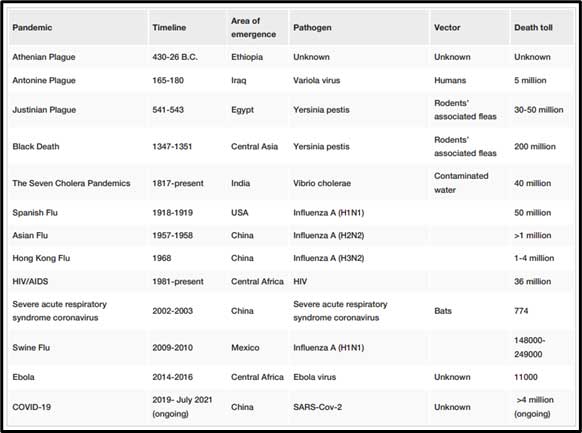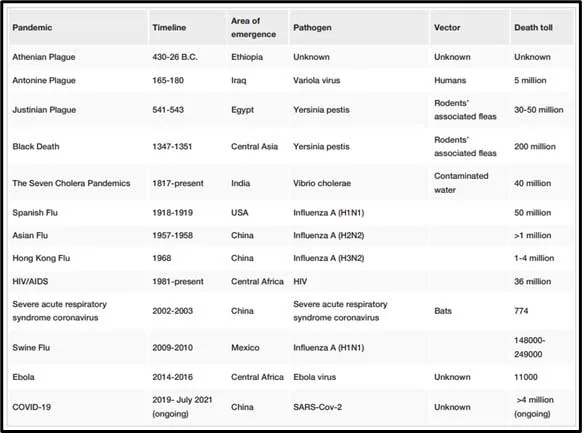A global pandemic is one of the new non-traditional security issues facing the world. The term “pandemic” was first used in 1666 to describe a disease spreading in a country. Since then, the terms epidemics and pandemics were often used alternately in social and medical contexts in the 17th and 18th centuries. However, as time passed, new concepts emerged. The terms endemic, outbreak, epidemic, and pandemic are used to describe how frequent and widespread a disease is compared to the previous one. These terms refer not only to infections, but also to non-infectious conditions such as cancer and hypertension. Endemic diseases affect populations in the same area, while outbreaks are a sudden increase in cases at new locations. An epidemic is a plague that spreads over a wider area than endemicity is expected, while a pandemic is an outbreak that extends to more than one continent.
One of the most recent pandemics that has shocked the world is the COVID-19 virus, which has spread worldwide since December 2019. The virus was first identified in Wuhan, China, and was classified by the WHO in March 2020. COVID-19 not only endangers human lives, but also has a negative impact on the global economy. Although the origin of the virus is unknown, Isroil Samiharjo, a biological weapons expert in Indonesia, states that there is no research to prove that COVID-19 is a naturally occurring virus. The spread of the COVID-19 virus has sparked global concern and forced many countries to formulate strict prevention and control policies to protect public health. Until now, research and handling is continuing to identify the exact source of the virus and stop its spread.
The COVID-19 pandemic has changed our perspective on security. Thro this time, security policy formulation has often focused only on traditional security issues, without considering the everyday problems faced by human beings. (masyarakat). Human well-being cannot be guaranteed by a national security model that focuses solely on military and territorial defence. This pandemic warns that security is not just a military issue but also about preventable diseases, pollution, malnutrition, and extreme poverty. Challenges like this are a greater existential threat than conventional threats to societies with low economic capabilities. Therefore, in order to protect human beings as a whole, security policy must be more open and involve all aspects of life in society.
This topic is important to discuss for several reasons. First, the COVID-19 pandemic is a very significant event in modern history. This pandemic has caused the deaths of millions of people, disrupted the stability of the global economy, and posed a variety of social and political challenges in various countries of the world. Second, the COVID-19 pandemic is a real form of a non-traditional security threat. Non-traditional security threats are threats that do not originate from military action, but can endanger human safety and well-being. These recommendations can be used by governments, international organizations, and civil society to improve human security in the future.
Global pandemics and their impact on human security
At the broadest level, the emergence of non-traditional security ideas refers to a shift from a traditional perspective of nation-centred security to a post-colonial perspective on security and the Third World. Its development is also driven by the desire of experts in the global south to make the “language” of security more relevant and represent the kind of modern challenge that significantly affects public security in developing countries. Non-traditional security problems mainly come from non-military sources, such as natural disasters, climate change, resource shortages, infectious diseases, irregular migration, food crises, human smuggling, drug trafficking, and transnational crime. It is a challenge for the survival and well-being of the people and the country. Often, these threats cover more than one country and oppose a unilateral solution. Therefore, a broad response in the political, economic, and social humanities is imperative.
The emergence of non-traditional security threats has revealed the weaknesses and limitations of state-centric security and security paradigms. Both the intensification of these threats and the country’s inability to cope with them have disrupted global security stability and highlighted the need to rethink the concept of security. This is reinforced by the emergence of the COVID-19 pandemic, in which microorganisms have been shown to be capable of spreading terror, kneeling nations, and threatening human security. This shift has then validated the pre-existing perception that the traditional security landscape is not ready to absorb new and widespread threats.


Figure 1. A list of pandemics throughout history. Source: Pandemic throughout History (Sampath, S., 2021)
Based on the data in Figure 1, we can conclude that the history of the pandemic has claimed millions of lives worldwide. It shows the fact that a global pandemic is as dangerous as a military conflict or an international arms war, or even a nuclear war. On the other hand, the COVID-19 pandemic shows that the consequences of non-traditional threats are not only very dangerous, but also very difficult to deal with by countries in the world. Despite adopting protective measures to reduce deaths from the virus, the country has failed to cope with the socio-economic impact of the pandemic and ensure its economic health and well-being.
Infectious diseases, unlike traditional security threats, cannot be cured through military action, detention, or bilateral diplomacy. On the contrary, this can only be cured or prevented through scientific cooperation, long-term investment in a robust global health system, and intelligent and strategic multilateralism. In terms of potential loss of life, disruption to society and livelihoods and its impact on the economy, epidemics of infectious diseases have long been one of the greatest threats to human security and global and economic security. We must now begin to treat it as one of the crucial issues in a non-traditional security context. The impact of this pandemic on the lives of billions of people, the global economy, and long-term stability is terrible. The longer it goes on, the harder it gets. It also shows the way to a new way of working in a fragmented global system, where attention to geopolitics is reduced and countries can continue to work together to solve problems where collaboration is really needed.
The threat of Covid-19 is targeting all humanity from all walks of life. However, Covid-19 will be more deadly for those who have the vulnerability. If the state ignores this, the state has violated the human rights of its citizens. There are at least seven indicators that people are susceptible to disease: poor people, malnutrition, chronic diseases, congenital disease, inadequate sanitation, crowded places, and limited access to health institutions such as clinics or hospitals. This seventh indicator should be a government priority.
In addition to the direct deaths caused by the coronavirus, there may also be many indirect deaths due to delays in seeking health care for other disorders or from overwhelmed health systems, or the redirection of resources to deal with the corona virus. Unexpectedly, the US and Britain, previously identified as the two countries most prepared to face the pandemic in 2019, just ended up being one of the worst affected due to slow and delayed government responses combined with social and health inequalities that have disproportionate impacts on racial and ethnic minority groups. As of March 10, 2021, more than 528,000 Americans and more than 125,000 British have died from the coronavirus.
In addition to the direct and indirect impact of death on humans worldwide, the COVID-19 pandemic also has a social and economic impact. Pandemics have caused economic impacts in the short and long term. The social resentment built up by the public because of the fear of pandemics is one of its contributors. To prevent exposure to the virus, people reduce contact with suppliers and reduce demand for goods and services that require direct contact. Although necessary to stop the spread, non-pharmaceutical interventions such as lockdown affect the livelihoods of millions around the world. The International Labour Organization (ILO) states that globally, COVID-19 has caused 400 million people to lose their jobs.
In the social sphere, pandemics are largely inexplicable and uncontrollable, bringing disasters to society, the economy, education, and health. This is mainly due to a lack of resources and public health knowledge about the mechanisms of disease. Interestingly, Black Death led to massive economic growth as societies had to develop labour-saving and efficient technologies to compensate for the loss of labour. However, at the same time, similar to COVID-19, Black Death led to the promotion of unscientific treatment, lack of medical resources, and circulation of fake news. One of the emerging possibilities of COVID-19, which can be beneficial, is an enhanced culture of working from home, which could happen to speed up the use of technology and increase human productivity.
Conclusion
The global pandemic of COVID-19 is a very serious threat to human security in non-traditional security issues. This pandemic has been one of the greatest events in the history of this century. Millions of people have died from this pandemic, disrupting the world economy, and causing many social problems. On the economic side, COVID-19 has halted economic activity, increased unemployment, and slowed global economic growth. On the social level, Covid-19 has increased inequality, domestic violence, and reduced social solidarity.
Overall, the COVID-19 pandemic is a significant human security threat. Different aspects of human life have been affected by this pandemic. Therefore, global pandemics need to be taken more seriously as one of the threats in the context of non-traditional security, especially as they relate to human security.
